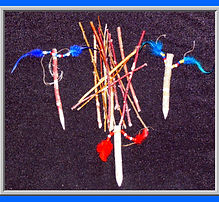ABOUT THE GAMES

“The games are an attempt to bring us back to a place of centeredness, a place of groundedness, a place of natural healing and natural competition. Anything that brings us back to those natural first connections is very healing in nature.”
~ Billie Jo Kipp, Blackfeet Community College
When we open the blanket, all nations are invited to play.
International Traditional Games Society (ITGS) has been dedicated to the recovery and preservation of traditional native games since 1991.
Even from the onset, youth were a key part of this recovery. Involving local students in the search, ITGS uncovered 20 traditional Blackfeet games, which students then presented to the elders, who added important cultural depth and history behind the games.
Staying true to our roots, much of our efforts today utilize this process as a tool for youth to absorb a positive cultural identity and develop leadership skills that can transform personal self worth and impact an entire community.

STONE PEOPLE GAME
Stone People’s Lodge game moves three river stones from one lodge to a new lodge, carefully placing the stones into the new lodge in the exact same way as the old home. Concepts: respect for stones, care in travel, making a new home. (Blackfeet game)

GUESSING STICKS
Guessing Sticks is a game played with three markers that are placed on the ground between 3 players. One member of the group holds all of the twigs in one bundle with both hands. Then, the holder quickly separates the twigs into two bundles, one in each hand. The other two people must guess how many twigs are in the hand closest to them. They must do this immediately, without hesitation. The players who are guessing must then count the twigs in their pile. If they have guessed (estimated) exactly right, they get a score stick. If neither estimates correctly then the play continues. All three counters must be won in order to win the game. After the counters have gone from the middle of the play area, they must be won from the other player. Estimation was an important skill for all tribes. (Chippewa)

GATHERING STONES
The Gathering Stones game is a transition game from European culture to American Indians during the boarding school days. Girls didn’t have a bouncing ball and jacks when they went home for the summer so they would play “Jacks” with smaller stones to gather and a throwing stone that was larger. The game was more difficult and was played with both the left and the right hands. (Tribal youth)

RING THE STICK
Ring and Pin games were played extensively by Plains Indian people and west coast tribes. The goal is to place the ring over the end of the stick . It was important to develop the hand-eye coordination on both sides of the body by using right hand then left hand in competitions. (Little Shell)

KICKBALL
Kickball races were held throughout the Americas. Sometimes stones or sticks were kicked throughout the race. Race lengths varied from 30 yards to 300 miles. Concepts: focus, concentration, endurance, and eye-foot coordination. (Universal in Americas)

STICKS
The game of Sticks is played with 10 thin sticks about 6” long that are held in a player’s fist with the bottoms of the sticks hidden in the lower fist. One stick is marked on the bottom. The idea of the game is to draw as many sticks as possible before getting the marked one. The winner of the game is the person who can draw the most sticks before getting the marked stick. This game is for developing pure intuition, until the person can identify the marked stick, then the game becomes the skill of observation. (Assiniboine)

MAKE STICK JUMP
Place the sticks in a line in the ground (outside) or in a cone on the floor (inside). Sticks should be placed 6 feet apart, but can be adjusted for age of participants. Players can take turns throwing a set number of rocks (or bean bags inside) at the sticks.The closest stick, if hit, is worth 1 point, second stick is worth 2 points, etc. up to 5 points. This activity was played by young children to practice hunting for small birds or small game. This was necessary when the adult hunters were gone a long time. (Blackfeet)

